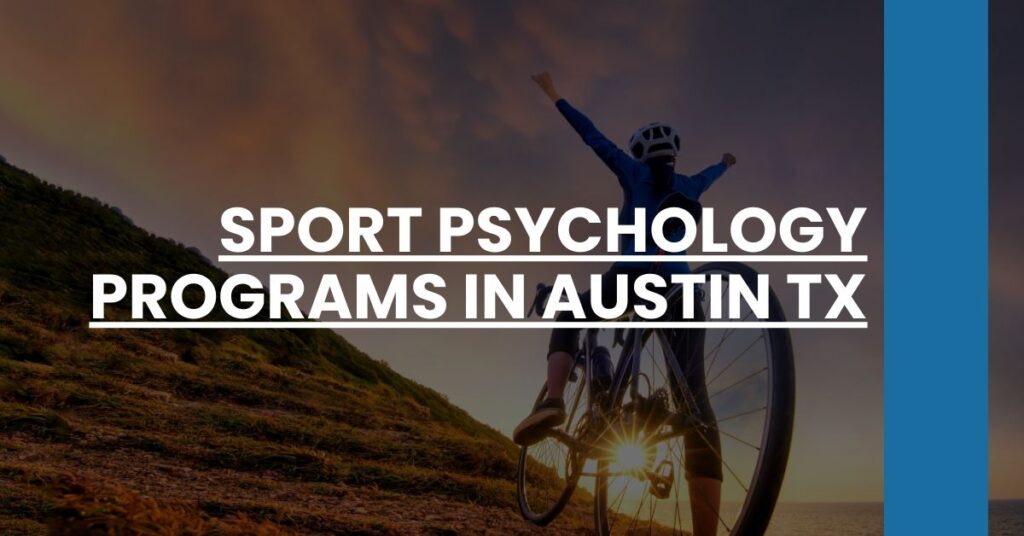Not in Austin? Check out our lists of Sport Psychology Programs in Brownsville, Carrollton, College Station, Corpus Christi, Dallas, Denton, Edinburg, El Paso, Fort Worth, and across Texas.
Are you an athlete looking to boost your mental performance?
Discover the top Sport Psychology Programs in Austin, TX that help athletes excel both mentally and physically.
Our guide covers the best programs, faculty expertise, and training opportunities to give you a competitive edge.
Texas Optimal Performance & Psychological Services (TOPPS) – Sport Psychology Programs
Discover exceptional sport psychology programs at Texas Optimal Performance & Psychological Services (TOPPS). Located in Austin, TX, TOPPS provides a range of services aimed at enhancing mental performance and overall well-being across various fields. Their personalized approach develops customized plans that cater specifically to your unique needs.
Key Services and Features
- Customized Plans: TOPPS tailors performance and treatment plans to each individual.
- Strength-Based Methodology: Focuses on enhancing your inherent strengths and abilities.
- Experienced Clinicians: Includes experts like clinical sport psychologist Hillary Cauthen and licensed psychologist Dr. Katie Hartmann.
- Mental Skills Training: Core areas such as goal setting, motivation, concentration, and stress management are emphasized.
Service Offerings
- Individual Counseling: Personalized one-on-one sessions.
- Group Counseling: Facilitates growth and learning in a group setting.
- Sport Group Sessions: Specifically designed to meet the needs of athletes.
- Corporate Wellness Programs: Tailored for executives, parents, coaches, and other professionals.
For more information on their services, visit Texas Optimal Performance & Psychological Services (TOPPS).
Texas State University – Minor in Sport Psychology
Texas State University offers a Minor in Sport Psychology that provides an in-depth understanding of how psychological concepts apply to health and exercise. The program consists of 21 semester credit hours and covers essential topics.
Curriculum Components
- Motor Learning
- Sensation and Perception
- Social Psychology
- Sport Psychology
- Electives: Options like the philosophy of sport or sociology of sport and leisure.
Key Learning Areas
- Training and Coaching Methods: Learn effective strategies to maximize performance.
- Teamwork and Leadership: Understand dynamics that drive successful teams.
- Motivation and Stress Management: Techniques to keep athletes motivated and manage stress.
- Social Issues in Sports: Explore diverse sociological aspects impacting sports.
Enrollment Requirements
- Prerequisites: PSY 1300 or an equivalent as part of the social and behavioral science general education.
For detailed information about the minor, visit the official Texas State University Minor in Sport Psychology page.
Choosing the right sport psychology program can play a vital role in reaching your athletic and professional goals. Ensure you select a program that aligns with your specific needs and objectives.
Texas State University – Sport Psychology Minor
Texas State University provides an extensive Sport Psychology Minor designed through the collaboration of both the Department of Psychology and the Department of Health and Human Performance. This 21-credit hour program comprehensively explores the relationships between brain biology and behavior in the context of exercise and sports.
Key Curriculum Components
- Psychology of Sports: Delve into social psychology and sport psychology.
- Exercise Science: Courses like psychosocial aspects of exercise and motor learning.
- Elective Options: Alternatives such as the philosophy of sport or sociology of sport and leisure.
- Practicum Experiences: Real-world applications through internships or practicums.
- Interdisciplinary Approach: Integration of psychology and health science domains.
Essential Topics Covered
- Teamwork and Leadership: Develop an understanding of team dynamics and effective leadership strategies.
- Motivation and Stress Management: Equip yourself with tools to maintain motivation and manage stress.
- Training and Coaching Methods: Learn innovative and effective coaching techniques.
- Social Issues in Sports: Grasp diverse sociological impacts on sports.
Pre-requisites and Enrollment
- Key Pre-requisite: PSY 1300, which fulfills the General Education Core Curriculum’s social science requirement.
- Enrollment Criteria: Emphasizes both theoretical and practical knowledge for a well-rounded education.
For detailed information, visit Texas State University Sport Psychology Minor.
Factors to Consider When Choosing Sport Psychology Programs
When selecting the right sport psychology program in Austin, TX, assess these factors to ensure they align with your career path and educational goals.
1. Program Accreditation
Accredited Programs: Choose programs accredited by reputable organizations to assure quality and standards.
2. Faculty Expertise
Experienced Faculty: Research the qualifications and real-world experience of the faculty. Professors with hands-on experience provide valuable insights.
3. Hands-On Training Opportunities
Practical Experience: Look for programs offering internships or practicums, ensuring that you can apply theoretical knowledge in real-world settings.
4. Curriculum Relevance
Comprehensive Curriculum: Ensure the program covers essential topics such as mental skills training, stress management, motivation, and performance enhancement.
5. Flexibility and Specialization Options
Customizable Curriculum: Select programs that allow you to choose electives and specialize in areas of particular interest, providing a tailored learning experience.
6. Support Services
Career and Counseling Support: Opt for programs offering additional services like career counseling, networking opportunities, and mental health support.
7. Cost and Financial Aid
Financial Considerations: Assess the cost of tuition and explore financial aid options such as scholarships, grants, or assistantships to help manage expenses.
8. Location and Accessibility
Convenient Location: Ensure the program’s location and schedule are manageable alongside your personal and professional commitments.
Conclusion and Next Steps
Sport psychology is an increasingly crucial field for athletes looking to enhance their mental performance and achieve peak physical capabilities. Whether you choose a specialized service provider like Texas Optimal Performance & Psychological Services (TOPPS) or a structured academic program such as the Texas State University’s Sport Psychology Minor, the right program can play a vital role in your success.
Evaluate your options based on the outlined factors, and take the next step toward optimizing your mental performance in sports. Explore the programs, reach out for more information, and make a choice that aligns with your goals and aspirations.

